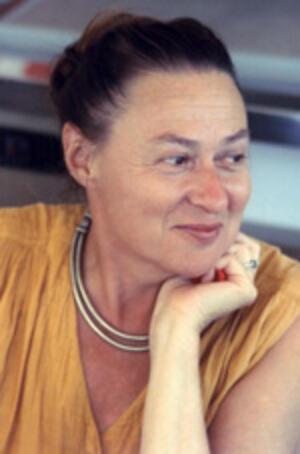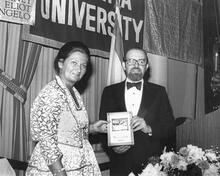Rachel Ertel
Born in Slonim (Poland), Rachel Ertel and her family escaped the Holocaust and emigrated to Paris after the war. Pursuing the tireless work of her parents, she has devoted her life to the promotion of Yiddish language and literature with an extraordinary passion. She played a major role in publishing the great works of modern Yiddish literature in French translation. In 2020, she was awarded the Prix d’Académie by the French Academy.
Rachel Ertel is unquestionably the most distinguished scholar of Yiddish culture in France. Yiddish culture filled her with pride from a very early age, and she has striven brilliantly since then to revive and keep it alive.
Family and Early Years
Ertel was born on July 13, 1939 in Slonim, a city in what was then Poland, to Riwa Mirski (1916–2001), a former student at the teacher-training school of Vilna, and Moishe Waldman (1910–1996), a Yiddish poet. Riwa Mirski is better known as an author of novels and short stories under the pen name of Menuha Ram, an acronym of Rachel (her older daughter), Aron (her step-son, b. 1938), and Myriam (her younger daughter, b. 1949). Her best-known works are Vayter fun trakt (Further than thought), Le Vent qui passe (The passing wind, 1974), and Exils (Exiles, 1993).
During the war, Rachel and her mother were placed under house arrest in Kazakhstan as enemies of the Soviet regime, thus escaping the Holocaust. Upon their liberation they returned to Lódz. The family fled Poland and emigrated to France, where they settled in 1948. Menuha Ram and Moishe Waldman took an active role in the cultural vitality that marked the post-war period, turning Paris into the heart of Yiddish culture across Europe.
A Scholar of American Literature
Rachel Ertel soon focused her energies on literature, a passion inherited from her forebears andr strengthened by frequent visits to the Guy Patin Center (opened by the Rothschild family). This establishment enabled writers, poets, and painters alike to congregate in a dynamic and stimulating environment. Among the many intellectuals who had come from the United States to Paris were H. Leivick (1886–1962), Jacob Glatstein (1896–1971), and Melech Ravitch (1893–1976).
A holder of the French title of Agrégée in English literature, Rachel Ertel pursued all of her studies in France. In 1978 she defended her doctoral thesis at the Sorbonne on the American Jewish novel, “Le roman juif américain: une écriture minoritaire” (The American-Jewish novel: a minority writing, published in French in 1980). She then went on to become a professor at Université Paris-VII Jussieu in Paris, where she worked until 2001. She taught American literature and founded the Center for Jewish-American Studies, which focuses on the various social, institutional, political and cultural aspects of American-Jewish society. Part of her research examines the Yiddish-speaking intelligentsia in Europe and the United States at the turn of the twentieth century and the avant-garde publications that community produced.
Rachel Ertel chose American studies as her field because in it she saw the idea of a pluralist culture that gave its writers the possibility of preserving a distinct identity. She was the first to emphasize this fundamental distinction between the American and French traditions, maintaining that France is a highly Jacobite and unifying country that erodes differences and does not allow Jewishness to be as explicitly included as it is in American literature.
Yiddish Literature
The American scene, while at the heart of her concerns, is not Ertel’s only area of interest. Combining her position as an English specialist with that of a distinguished Jewish scholar, she turned the field of Yiddish studies into an area of multiple explorations that extended well beyond the American territory. She assigned herself the task of introducing to the French public both American and European Yiddish literature, in particular by creating the collection Yiddish Fields, which published Jewish authors from Eastern Europe and included translations of poetry, essays, and plays, in order to demonstrate her view that Yiddish literature constituted a vast sounding-box of world literature.
Ertel devoted herself to training Yiddish translators and publishing Yiddish authors in French, translated directly from the original language (not from German or Russian, for example). In her opinion, the act of translation encompasses more than a simple transfer from Yiddish to French; it stems from an authentic act of bearing witness.
One of the distinguishing events of Ertel’s entire life’s work was the organization, with other intellectuals, of the Journées de la culture Yiddish (Days of Yiddish Culture) at the Centre Georges Pompidou in Paris in 1978. This event was part of the general movement of the diasporic spread of Yiddish. She later published Le Shtetl (1982), about the Jewish shtetl in Poland from early to modern times, Une maisonette au bord de la Vistule, et autres nouvelles du monde Yiddish (A little house on the Vistula and other news from the Yiddish world, 1989), Dans la langue de personne: poésie yiddish de l’anéantissement (In nobody’s language: Yiddish poetry of annihilation, 1993), and Brasier des mots (Furnace of words, 2003).
In tandem with her work as a translator, Rachel Ertel carried out a remarkable project that involved tracing the extensive historiography of genocide back to a reflection on the annihilation of a language, which—in a term that has since gone down in history—became “nobody’s language.” For Ertel, the poetry of annihilation represents a unique literary territory characterized after genocide by an abundance of words unlike those of other fictional genres. The poetry of annihilation refers not only to that written in the very places of extermination, but also to any writing haunted by this abyss of history: poetry in which Ertel has attempted to bring together the many voices into a sort of general narrator, considering the millions of voices annihilated by the Shoah as both individuals and from a collective perspective.
Of all her writings, Brasier des mots, published in 2003, is undeniably Ertel’s most accomplished reflection on the question of the assassinated language. While speaking today about the rebirth of Yiddish as a language or literature may be wishful thinking, one cannot fail to be struck by the uniquely contemporary emergence in France of works in which Judaism forms a fragile part and on which the Holocaust, which granted to language a radically new status because of its inability to grasp such an extreme reality as the death camps, makes an indelible impression. In the work of writers such as Serge Doubrovsky or Patrick Modiano, the Holocaust is assimilated to become a sort of dybbuk that challenges both the imagination and writing, condemning the works to an undefined generic wandering. The heterogeneous form of Brasier des mots falls under this wider category of works by contemporary authors that history saved from extermination, but which nevertheless bear the mark of the insurmountable hold the Holocaust has over writers.
In 2019, Rachel Ertel published Mémoire du Yiddish: Transmettre une langue assassinée (Memory of Yiddish: Transmitting an assassinated language), an interview with the French journalist Stéphane Bou based on a previous five-episode radio interview. For the first time, she looked back on her life’s journey, sharing with the reader a form of intimacy. However, like Georges Perec, who was unable to provide a classical autobiographical account and claimed “I have no childhood memories,” Ertel looks at the origins of her dedication to Yiddish and how it shaped her intellectual life. At the heart of this exploration lies the Yiddish “phalanstery” of the rue Guy Patin and its bubbling creativity, previously recalled in the article “Les fantômes du 9 rue Guy Patin (en souvenirs)” (The ghosts of 9 rue Guy Patin [in memories]). Beyond the singularity of her individual destiny as a silent witness who has never published her autobiography and never used the pronoun “I” in her writing, this book allows the reader to grasp the history of post-Holocaust Yiddish language and culture and twentieth-century French Jewish history.
Since 2003, Rachel Ertel has been the honorary president of the Yiddish Cultural Center in Paris, where Yiddish language and literature courses have been given for many years by Yitshak Niborski, the other great craftsman behind the preservation of Yiddish culture in France.
In 2020, Ertel received the Prix d’Académie awarded by the French Academy for her entire body of work.
Ertel, who was married to Marcel, a cardiologist (1938–2003), has two daughters: Judith (b. 1961) and Emmanuelle (b. 1969), both teachers of literature.
Selected Works by Rachel Ertel
En marge des minorités aux Etats-Unis (in collaboration with G. Fabre et E. Marienstras). Paris: Maspero, 1971.
Le roman juif américain: une écriture minoritaire. Paris: Payot, 1980.
Le shtetl: la bourgade juive de Pologne de la tradition à la modernité. Paris: Payot, 1982, (2nd edition 1988).
Une maisonnette au bord de la Vistule et autres nouvelles du monde Yiddish. Paris: Michel, 1989.
Khalinstra- “La bande”: revue futuriste yiddish, Varsovie, Paris 1922–1924. Paris: 1989.
Sutzkever, Avrom. Où gitent les étoiles, préface de Rachel Ertel and translations by the CEJA. Paris: Seuil, 1988.
Dans la langue de personne : poésie yiddish de l’anéantissement. Paris: Seuil, 1993.
J. Baumgarten, R. Ertel. I. Niborksi, A. Wieviorka. Mille ans de cultures ashkénazes. Paris: Levi, 1994.
R. Ertel, G. Fabre (sous la direction de) “Configurations de l’Ethnicité.” In Cahiers Charles V N°15. Paris: 1993.
Brasier des mots, Paris: Levi, 2003.
Le Shtetl, la bourgade juive de Pologne de la tradition à la modernité. Paris: Payot & Rivages, 2011 (2nd edition).
“Les fantômes du 9 rue Guy Patin (en souvenirs)” (The ghosts of 9 rue Guy Patin [in memories]). Les Temps modernes, No. 686 (May 2015): p. 21-54.
“Nous sommes les souvenants qui refusons l'oubli.” Interviews with Stéphane Bou. Mémoire du yiddish: Transmettre une langue assassinée. Paris: Albin Michel, 2019.
Audio documents
“Mémoire du Yiddish,” with Stéphane Bou. À voix nue, France Culture, 5 episodes, March 2017.
New-York, tendances yiddish, with David Unger, Paris: 2012 (DVD 52 min).
Translations
Asch, Sholem. Moscou, Paris: Belfond, 1989.
Brodsky, L. D. and William Heyen. Chassés du paradis : poèmes de l’Holocauste à deux voix. Paris: 1998.
Chekhtman, Elie. A la veille de … . Paris: Les éditeurs français réunis, 1964.
Hill, Christopher. Le Monde à l’envers (The World Upside Down) (with Simone Chambon). Paris: Payot, 1977.
Leivick, H. “Poèmes et extraits d’œuvres dramatiques.” In Leivick Poète yiddish (sous la direction de M. Waldman). Paris: Gopa, 1965.
Mann, Mendel. Au bord de la Vistule. Paris: 1960.
Mann, Mendel. “La Ballade du Rocher de Petra.” In La Table Ronde. Paris: 1960.
Rabon, I. Balaty. Paris (forthcoming).
Rabon, I. La rue. Paris: 1982.
Ram, Menuha. Le Vent qui passé. Paris: Juilliard, 1974.
Spiegel, I. Les Flammes de la Terre. Paris: Gallimard, 1973.
Spiegel, I. Une échelle vers le ciel. Paris: Gallimard, 1980.
“Dix poètes yiddish de l’anéantissement.” In Dans la langue de personne, Les Temps modernes, Poésie. N° 568, Paris: November 1993.
Zychlinski, Rajzel. Portes muettes. Paris: L’Improviste, 2007.




